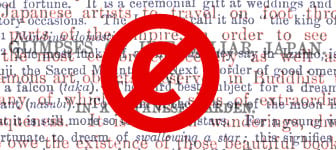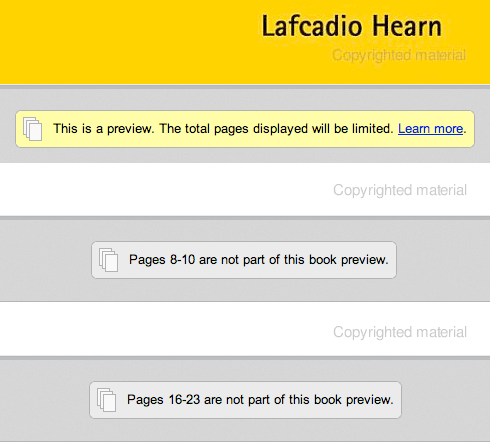Original URL: https://www.theregister.com/2009/06/26/copyfraud/
Copyfraud: Poisoning the public domain
How web giants are stealing the future of knowledge
Posted in Legal, 26th June 2009 12:21 GMT
Special report The public domain is the greatest resource in human history: eventually all knowledge will become part of it. Its riches serve all mankind, but it faces a new threat. Vast libraries of public domain works are being plundered by claims of "copyright". It's called copyfraud - and we'll discover how large corporations like Google, Yahoo, and Amazon have structured their businesses to assist it and profit from it.

Copyfraud first came to my attention nearly two years ago in my scholarly research. As Google Books began releasing massive numbers of newly scanned public domain books, Japanese Studies scholars excitedly announced their discoveries. I found links to books by one of the first American journalists to arrive in Japan, Lafcadio Hearn. Scans of his books from the 1890s onward - with their eccentric letterpress typography and gold foil stamped leather covers - give us the details of presentation and are the minutiae that launched a thousand dissertations. This is just the sort of material that excites scholars like me; we examine his books to see how the West first came to understand Japan.

But Hearn's books also have commercial value as public domain works. Hearn's book of traditional Japanese ghost stories, Kwaidan was released as a film in 1964 and was nominated for an Academy Award; a modern film homage appeared in 2007. Hearn profited by recording, translating, and publishing a book of traditional folk tales. When his book lapsed into the public domain, it was used again as source material for a copyrighted commercial derivative work on film. This recycling of ancient oral tradition by Hearn helped propel a generation of big-budget horror films, becoming a profit centre for movie studios in both America and Japan.
Upon hearing the news of Hearn's work appearing on Google Books, I searched for Hearn's classic Glimpses of an Unfamiliar Japan. Although a freely downloadable scan of Volume 2 was available, only a limited preview edition of Volume 1 from Kessinger Publishing was available, under a 2004 "copyright". The preview edition was marked "Copyrighted material" on every page. Many pages were omitted, the book is nothing but an excerpt.

Another public domain classic disappears. But why?
Kessinger made the document useless to scholars, to force them to purchase the full hardcopy edition for $25. Links on the Google Books page directed purchasers to the Kessinger edition on Amazon.com and other online booksellers. Scholars were outraged. These works are clearly in the public domain, dating back to the 1890s and beyond.
When questioned, Google said it "must err on the side of caution... until we have determined that the book has entered the public domain." But with the sheer volume of ebooks being submitted by outside publishers, there are obvious delays in clearing rights. Some publishers have exploited this gap, providing copyfraud editions where no free edition was available.
Google suggested waiting patiently, as surely these missing volumes would eventually be scanned and added to its free online library. But the practice began to spread. Other publishers followed Kessinger's model and several more copyfraud editions of Volume 1 followed. Nearly two years later, a freely downloadable scan of Volume 1 finally appeared. Some publishers had used the two year gap to profit.
We can see the publishers' motivation. Their business model has been ruined. There is a long tradition of small publishers selling facsimiles of rare public domain books. They were a precursor of the print-on-demand online model, collecting and curating large libraries of obscure, disreputable, and uncommercial works on topics like occultism, homeopathy, military history, and crackpot cancer cures, and selling them to niche markets. But with the advent of Google Books, their market has evaporated: the books are no longer scarce. So they fought back the only way they knew how, by exploiting the gaps in Google's book coverage.
Copyfraud: How to do it
Committing copyfraud is astonishingly easy and costs nothing. I can borrow a public domain book from any library and scan it, or I could download the text from Project Gutenberg. I reformat it as a PDF, mark it with a copyright date, register it as a new book with an ISBN, then submit it to Amazon.com for sale. I may not even need to print and bind any books, I can offer it through Amazon's Booksurge print-on-demand service, or as an ebook on Kindle. Once the book is listed for sale, I can submit it to Google Books for inclusion in its index. I could easily publish thousands of books; most would never sell, but with zero up-front cost, any sale is pure profit.
But why would Google and Amazon permit this exploitation of the public domain? It could be argued it would be better to index these copyfraud editions. Perhaps it's better to have access to a fraudulently copyrighted, paid edition rather than no edition at all. I disagree. Google Books has structured its online service with no regard to preventing abuses, and so has created a financial incentive for some publishers to game the system. Google also has its own incentive, as it earns a small kickback on every sale referred to Amazon or other booksellers. Essentially, this system has become a successful inversion of the "micropayments" model, Google is profiting by administering millions of small transactions which divert vast sums of money to undeserving, unscrupulous publishers. Perhaps we should call it "microfraud".
Just as scholars were discovering their restricted access to these public domain works, Law Professor Jason Mazzone released a groundbreaking article, "Copyfraud", examining the problem and its impact. Mazzone asserts this type of copyfraud is targeted at universities. A recent infringement lawsuit denied universities Fair Use access to copyrighted materials, and has made them reluctant to use materials bearing even a fraudulent copyright. Some publishers profit from muddling the status of the copyright, so universities must force students to purchase documents they could otherwise obtain for free, driving up the cost of higher education."
Corporate interests like movie studios have an incentive to enforce legal access to the public domain, it is their source material, and they have an army of lawyers to back them up. But scholars have no such resources. A penniless student may be able to afford a $25 copyfraud edition, but not an expensive lawyer to sue to protect his rights.
Professor Mazzone also discusses another interesting case where a claim of copyright can be attached as a condition of access. This is the "sole-source monopoly", where only a single copy of a public domain work exists. I have previously discussed this issue in my article 'How To Copyright Michelangelo', Astonishingly, this pseudo-copyright has also afflicted the Leader of the Free World, President Obama.
Enter Obama, bearing Web 2.0 gifts
All works of the US Government are in the public domain. It's a condition of Federal Law. Recently, Yahoo's Flickr photo service was granted exclusive access to the Official White House Flickr Photostream.
But because Flickr is ideologically committed to Creative Commons licensing, it offered no licensing tags for public domain material, claiming it had no way to check every submission was truly public domain. This forced the White House photos to be licensed under a CC license. But CC relies on copyright. It is merely a waiver of rights granted by copyright, and these public domain works could never be assigned copyright. Users objected to Flickr assigning licensing restrictions where none could legally be imposed. Flickr initially refused to change its licensing terms, defending their use of CC licenses. They have since relented, creating an exclusive new category of "United States Government Work," linking to a document describing their public domain status, rather than just assigning a public domain tag. Now Creative Commons seeks expanded authority to administer the Public Domain, by issuing a "Creative Commons Public Domain License," as if it was a sublicense of its own invention. Creative Commons is trying to expand its licensing authority over not just newly created works, but all public domain works.
![]()
Public domain licensing is still not available to any Flickr user. This forces everyone, from individuals to large public institutions, to contribute their works to the "Flickr Commons" under a CC license, even if the works are clearly in the public domain. Flicker is enacting a blatant power grab on behalf of Creative Commons. They are establishing an extra-legal licensing monopoly, imposing an illegal copyright license structure on free works. And this is the most pernicious effect of copyfraud: it exploits the public domain to aggregate monopoly power for private interests.
Creative Commons seeks to become the arbiter of public domain licensing, yet it has no governmental authority and cannot enforce its licenses. Nor is it subject to Congressional oversight like the Copyright Office.
Google's land grab
Google is engaged in a similar power struggle. Under the Google Books settlement with publishers, the company has already negotiated expanded authority to administer copyrights on "orphan books," legitimately copyrighted books that are out of print. Google wants to become an alternate registrar for the public domain, keeping a registry of American books that publishers have failed to renew copyrights. This database was scraped from government online records, but Google says this list is not authoritative or exhaustive, even conceding that errors are likely. So Google is unofficially performing official governmental regulatory powers on copyrights. This should be prevented, handled only by the true governmental authority: The Library of Congress. Eventually Google will collect payments and distribute royalties for orphan books, giving Google truly monopolistic control of both copyright and the profits from copyrighted books.
Google's public domain book scanning project has enhanced its authority as the primary internet source for the world's written knowledge, giving Google a powerful bargaining position when it negotiated the orphan books settlement. Once Google drove out rival book scanning projects like Microsoft Live Search, publishers had little ability to resist Google's monopoly, forcing them to settle for less.
Google has usurped governmental functions that protect the public interest with a failed bureaucracy that serves only private profit. And Google is well positioned to continue their power grab, there are now three ex-Google executives on the White House staff. Google's chief policy executive will become the government's Deputy Chief Technology Officer. And now Google has announced its intention to sell ebooks through Google Books, directly competing with Amazon and other booksellers. Google has leveraged its power to become a publishing monopoly.
A plan to beat Copyfraud
What can be done to protect the public domain from such opportunism?
As Professor Mazzone says, "Copyright law suffers from a basic defect: the law's strong protections for copyrights are not balanced by explicit protections for the public domain." The balance must be restored. There is nobody devoted to protecting the public trust against the forces who would exploit it. Only governmental authority can protect this public resource, and governments must act to protect our common rights.
Dominant corporate interests like Google can easily create systemic abuses against the public trust. They must be restrained. Copyright law should be enhanced to protect the public interest, but existing law has enough regulatory power - if the government has the will to use it. Allowing these abuses to continue will only lead to new monopolies.
Government should act to secure its authority over copyrights, stopping the self-interested meddlers like Creative Commons and their Public Domain licensing, and Google's registry of lapsed copyrights.
Private interests should be prohibited from exerting pseudo-regulatory powers, as well as the means to profit from their own regulation. Anti-trust actions could break up the newly forming publishing cartel before it becomes entrenched. At a minimum, Google's orphan books settlement should be given further judicial review and invalidated. Google and Amazon should be prohibited from offering books with false copyrights, the public should be empowered to flag copyfraud books and issue a take-down notice.
Publishing should not be permitted to become a Google-Amazon oligarchy. Let us not forget what happened when a single portal to the entirety of the world's books was assembled: the ancient Library of Alexandria burned to the ground, taking everything with it. Nobody should be allowed to become a single portal to the world's knowledge. ®
Charles Eicher is an artist and multimedia producer in the American Midwest. He has a special interest in intellectual property rights in the Arts and Humanities. He writes at the Disinfotainment weblog.